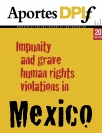In this edition of AportesDPLF, we examine the current situation of human rights in Mexico.
The first section of this edition examines the serious human rights violations taking place in Mexico. On this subject, the former Attorney General of Guatemala, Claudia Paz y Paz, explains to us how the Ayotzinapa case exposed the main shortcomings of the Mexican criminal investigation system. Based on her experience as a member of the GIEI, she proposes a number of recommendations for improving the system. Along these same lines, Ariel Dulitzky, a member of the United Nations Working Group on Enforced or Involuntary Disappearances, sets forth 20 points for the creation of a public agenda for the prevention and eradication of forced disappearance in Mexico.
The former UN Special Rapporteur on Torture, Juan Méndez, shares his main conclusions from the mission he conducted to Mexico in his capacity as rapporteur. This section is concluded by Eric Witte of OSJI, who offers an in-depth analysis of why certain crimes currently being committed in Mexico could be considered crimes against humanity. The reform of the Mexican criminal justice system is addressed in the second section of this edition.
Miguel Sarre calls attention to the false dichotomy between defendants’ rights and the right of victims to truth and justice, while Iván de la Garza addresses ongoing challenges in the implementation of the new adversarial criminal justice system, in effect throughout Mexico since June 2016. Finally, Carlos Ríos examines the role of precautionary measures in the new adversarial system and explains how the culturally rooted values of the inquisitorial system could hinder the proper implementation of pretrial detention.
The third section includes some reflections on fundamental institutional reforms that are being carried out in Mexico. Úrsula Indacochea of DPLF discusses the intense involvement of political bodies in the selection of senior justice system authorities in Mexico, noting the lack of effective checks and balances. Óscar Arredondo describes the new National Anti-Corruption System, the challenges that have arisen since the constitutional reform of 2015, and the steps that remain to be taken for its proper implementation. Aroa de la Fuente addresses the issue of energy reform in Mexico and describes the current situation, three years after its enactment.
The vulnerable situation of certain sectors of the population in Mexico is examined in the fourth section of the journal. Leopoldo Maldonado of ARTICLE 19 presents the reality faced by Mexican journalists and shows that the war on drug trafficking has affected the exercise of freedom of expression in different ways. Ana Lorena Delgadillo of the Foundation for Justice and Rule of Law addresses the situation experienced by the relatives of disappeared migrants and explains how these families’ organizations have promoted the creation of a transnational mechanism that would allow them to access justice.
To conclude this edition, the fifth section, entitled "From the states," provides a window on the situation in the interior of the country. Sister Consuelo Morales and Ana Claudia Martínez describe the current conditions in Nuevo León, highlighting the role of public opinion in the proper implementation of the new criminal procedure system in that state. In Chihuahua, Lucha Castro tells us how, in view of the security crisis unleashed by the war on drug trafficking, civil society and the state government have formed a partnership to combat impunity and corruption.
From Coahuila, Michael Chamberlin explains how the joint efforts of relatives of disappeared persons created an impact that led to the creation of a Working Group composed of civil society, the United Nations, and state authorities, which has promoted state reforms on the issue of forced disappearance. César Pérez details how the practice of torture continues to go unpunished in the state of Jalisco, despite state reforms to criminalize such conduct.
Finally, David Lovatón shows that the state of Yucatán—although it does not face the same serious human rights situation as the rest of the country—also has significant issues, many of which are related to protection of the human rights of Mayan indigenous communities.
Read the latest edition of AportesDPLF here.






